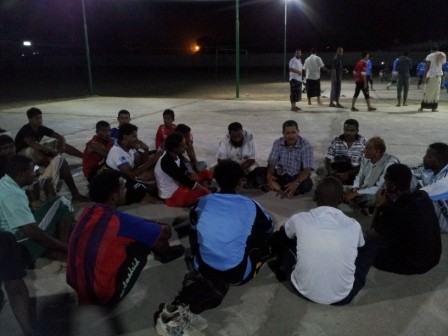
All around Yemen in the evening, the electricity often goes out and the country’s teens and young adults are left idle with few productive activities or social diversions. Yemeni youth, like youth anywhere in the world, crave achievement for their own futures. Without outward signs of opportunity, big dreams about the future will fade.
Like many countries in the Middle East, Yemen has a large youth population—the median age is 18 years and 50 percent of the population are under the age of 16. However, long-standing economic and social problems have left Yemeni youth with few, if any, places to develop, belong and connect with one another. While some young adults are enrolled in college or are employed, many are jobless or do not make enough money to care for themselves or their families.
A few young people are fortunate enough to participate in organized sports or recreational activities, but most young men are lucky just to find a less-trafficked street suitable for a makeshift soccer game. For many youth, there is little hope on the horizon.
USAID’s Promoting Youth Civic Engagement (PYCE) project is resolved to make a difference for Yemen’s youth population. From June to September 2013, PYCE volunteers conducted outreach in their communities and galvanized more than 3,000 young men and women, ages 10-30, to participate in the Summer Connections Program.
PYCE gathered community leaders and members at all levels and identified schools, clubs and other youth-serving organizations that could function as centers of leadership development and recreational activities. After a lengthy selection process, youth in four governorates were trained to plan, organize and conduct education, sports and community-service programs for their peers at the centers.
PYCE conducted renovations and provided equipment for these centers, including the installation of 11 solar power systems. With solar power, activities can take place at any time, despite the ongoing power outages that often disrupt daily life in Yemen and make it impossible to plan for and hold activities. These activities have provided a positive outlet for youth who are out of school and unemployed and who need the motivation and job skill preparation for potential careers and future business ventures.
The Summer Connections Program emphasized both life and vocational skills while promoting safety, environmental awareness and community-oriented volunteerism—things that many program participants have experienced for the first time. With every activity, participants became more energized and optimistic about their future. The training and skill development is designed to help youth reverse the negative impact of social and economic difficulties in their country.
“The program is successful because activities like these help youth develop themselves, especially those who did not have the opportunity to finish their education,” said Mustafa Haidera, 20, a program participant.
Center volunteers are continuing their outreach and activities now that the school year has begun, and are currently working with community leaders to expand and sustain the program for years to come. Their peers have embraced this effort and are helping to transform schools and restore lives.
The PYCE project, which runs from 2010 to 2014, is part of a larger USAID/Yemen effort to engage youth to address challenges in their communities. As youth participate in positive activities, interact with their peers, and benefit from increased services, they become more optimistic about the future and more effective citizens. This engagement, in turn, promotes stability and development at the community and national levels.







Comment
Make a general inquiry or suggest an improvement.